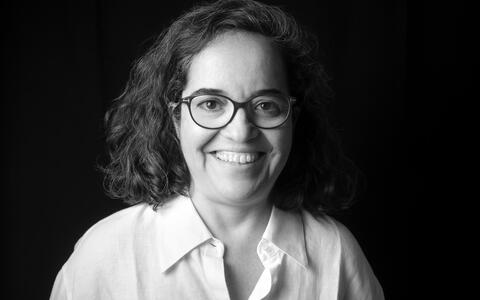MDC research funded by NIH award
Research teams across the University of California San Diego campus, elsewhere in the U.S., in Italy and at the MDC, have received a 5-year grant totaling $6.5 million from the National Institutes of Health (NIH) Common Fund. They will now continue their work under the umbrella of the 4D Nucleome Program – a collaborative research initiative launched in 2015 and aimed at better understanding how DNA is arranged within the cell’s nucleus in four dimensions (the three dimensions of space plus time) and how changes in that nuclear organization affect human health and disease.
Six separate but interrelated initiatives comprise the 4D Nucleome Program. The initiatives, led by 30 different research groups throughout the United States, feed into an organizational hub. Professor Ana Pombo from the Max Delbrück Center for Molecular Medicine in the Helmholtz Association (MDC) member in one of the initiatives that has now received funding, the Center for Integrated Multi-Modal and Multi-Scale Nucleome Research, led by Professor Bing Ren from UC San Diego. Pombo’s lab at the MDC’s Berlin Institute for Medical Systems Biology (BIMSB) has been awarded $400,000 for five more years. She was also a contributing member to the 4D Nucleome Program during the 2015–2020 phase.
“These grants mark phase two of our work,” said Ren, the center’s leader, and professor of cellular and molecular medicine, member of the Ludwig Institute for Cancer Research and director of the Center for Epigenomics at UC San Diego School of Medicine. “The focus of the research has shifted from developing powerful technologies for exploring the 3D genome topology in mammalian cells cultured in vitro or in primary tissues in bulk to applying state-of-the-art technologies to complex tissues across development, species and cell types at single-cell resolution.”
Research to focus on non-coding DNA regions
The genetic basis of most diseases is unknown. For those diseases for which specific genetic risk factors have been identified, most do not involve the part of DNA that codes for proteins. Instead, the majority of known genetic risk factors for disease are located in the non-coding regions of the human genome. A significant portion of these non-coding regions act to regulate exactly when and how certain genes are turned on or off. However how everything functions in space and time is largely unknown.
A major barrier to decoding the human genome, researchers said, is a lack of maps, models and tools to understand how transcriptional control sequences are spatially and temporally organized in the nucleus to regulate gene expression. The proposed research seeks to produce those necessities required to understand more fully how genes underlie and affect disease.
Our genomics data will help generate cell-type-specific reference maps of 3D chromatin architecture in mouse, macaque and human brains.
Pombo and her team will focus on regulatory programs in a complex tissue: the brain. “We will therefore produce 3D maps of how chromosomes are folded in different cells and tissues of the brain, and how they change during development, using Genome Architecture Mapping (GAM), a unique genomics technology that we have developed at the MDC,” says Pombo. “Our genomics data will help generate cell-type-specific reference maps of 3D chromatin architecture in mouse, macaque and human brains.” They will make their findings, analytical tools, visualization methods and structural models available to the broader scientific community. Along with MDC visiting scientist Professor Mario Nicodemi, who is also funded by the Einstein Foundation Berlin, and Professor Maria-Elena Torres Padilla from the German Research Center for Environmental Health in Munich, Pombo’s team is currently one of the three European labs funded in the new program.
- 4DN Center for Data Integration, Modeling and Visualization at UC San Diego
-
-
In this initiative, the team will create a research center led from UC San Diego that uses state-of-the-art high-throughput imaging, genomics and computational tools to study the nuclear organization in brain cells across development in both the laboratory mouse models and in humans with the goal to better understand the three-dimensional organization of mammalian genome.
Approximately $6.5 million was awarded to UC San Diego to continue a 4D Nucleome Program initiative led by Ren; Xiaowei Zhuang and Catherine Dulac at Harvard University in Boston; Ed Lein, senior investigator at the Allen Institute of Brain Sciences in Seattle; Ana Pombo, professor of epigenetic regulation and chromatin architecture at Humboldt University of Berlin and deputy scientific director at the Berlin Institute for Medical Systems Biology at the Max Delbrück Center for Molecular Medicine in the Helmholtz Association (MDC); Mario Nicodemi, professor of physics at the University of Naples Federico II; and Ting Wang, a computational biology and professor of genetics, computer science and engineering at Washington University School of Medicine.
Co-investigators include Ming Hu, a biostatistician at Cleveland Clinic, and Margarita Behrens, a neuroscientist at Salk Institute for Biological Studies.
Further information
- UC San Diego press release (October 2020)
- Portrait of Ana Pombo
- MDC hosts three outstanding researchers
Downloads
Ana Pombo in the Lab. Photo: Pablo Castagnola, MDC
Ana Pombo Portrait Picture. Photo: Pablo Castagnola, MDC
Media Contacts
Professor Ana Pombo
Head of the lab Epigenetic Regulation and Chromatin Architecture
Max Delbrück Center for Molecular Medicine in the Helmholtz Association (MDC)
Ana.Pombo@mdc-berlin.de
Christina Anders
Editor, Communications Department
Max Delbrück Center for Molecular Medicine in the Helmholtz Association (MDC)
+49 30 9406-2118
christina.anders@mdc-berlin.de or presse@mdc-berlin.de
The Max Delbrück Center for Molecular Medicine (MDC)
The Max Delbrück Center for Molecular Medicine in the Helmholtz Association (MDC) is one of the world’s leading biomedical research institutions. Max Delbrück, a Berlin native, was a Nobel laureate and one of the founders of molecular biology. At the MDC’s locations in Berlin-Buch and Mitte, researchers from some 60 countries analyze the human system – investigating the biological foundations of life from its most elementary building blocks to systems-wide mechanisms. By understanding what regulates or disrupts the dynamic equilibrium in a cell, an organ, or the entire body, we can prevent diseases, diagnose them earlier, and stop their progression with tailored therapies. Patients should benefit as soon as possible from basic research discoveries. The MDC therefore supports spin-off creation and participates in collaborative networks. It works in close partnership with Charité – Universitätsmedizin Berlin in the jointly run Experimental and Clinical Research Center (ECRC), the Berlin Institute of Health (BIH) at Charité, and the German Center for Cardiovascular Research (DZHK). Founded in 1992, the MDC today employs 1,600 people and is funded 90 percent by the German federal government and 10 percent by the State of Berlin.






